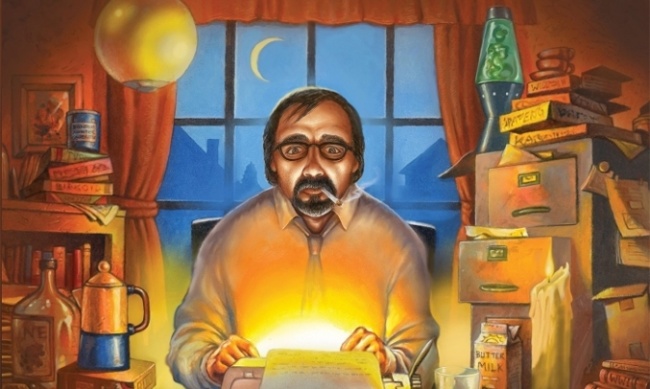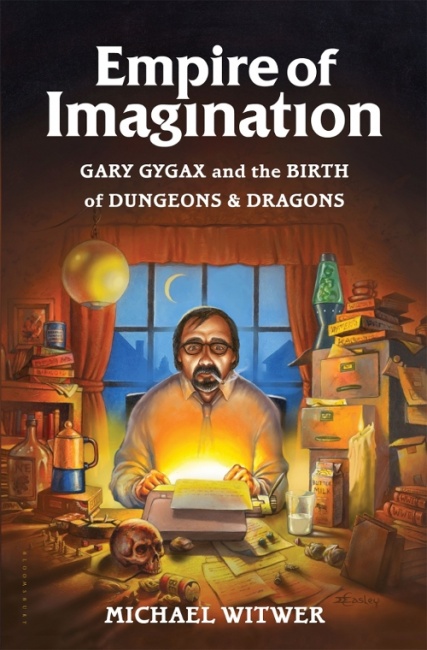Rolling for Initiative is a weekly column by Scott Thorne, PhD, owner of Castle Perilous Games & Books in Carbondale, Illinois and instructor in marketing at Southeast Missouri State University. With Gary Con coming up this week, Thorne reviews Michael Witwer's book on Gary Gygax.
With Gary Con, the annual convention in Lake Geneva Wisconsin that honors the memory of E. Gary Gygax and serves as a reunion for many of the employees of TSR during the 1970s and 1980s, taking place this coming weekend, I finally pulled my copy of Michael Witwer's Empire of Imagination: Gary Gygax and the Birth of Dungeons & Dragons from the stack, and regretted not having done so earlier as Empire of Imagination proved a fascinating read, completed in a single sitting.
Witwer uses an amazing number of primary sources as he tells Gygax's story, citing interviews with Gygax's ex-wife Mary Jo as well as several of his children and former TSR employees. Witwer does take creative license with some events, as he mentions in the book’s foreword, most notably in the first chapter covering Gygax's thoughts and actions after his ouster from TSR. He also provides several stories from Gygax's childhood, including his ventures into the ruins of Oak Grove Sanatorium and the tunnels beneath it as well as his encounters with the paranormal in his childhood home in Lake Geneva, inferring that these experiences had an effect on Gygax's later career.
Empires really gets rolling after Gygax's first marriage to Mary Jo Powell and his growing involvement in wargaming, first as a player, then commentator and designer. Witwer does an admirable job of presenting Gygax as human, showing both his virtues and flaws while also describing the development of the Dungeons & Dragons roleplaying game and the creation and growth of TSR. The book really shone in its off-the-cuff mention of a number of facts that I did not know such as Gygax's dislike of Tolkien's writings (he preferred Robert E. Howard's Conan stories), that the Monster Manual was the first of the AD&D books published, and how the term "roleplaying game" developed.
Witwer also looks at Gygax's time in California as head of TSR (quickly changed to Dungeons & Dragons) Entertainment with both successes (the D&D cartoon) and failures (the never produced D&D movie that tentatively had Orson Wells signed as a villainous mage); his New Infinities publishing company; the development of Dangerous Dungeons (later Dangerous Journeys after a threatened lawsuit by TSR); and how his work with computer RPGs led into his final tabletop RPG system Lejendary Adventures, published first with Hekaforge Productions and later, Troll Lord Games, a series of ups and downs made more relatable because many of the products and companies mentioned are familiar ones.
Witwer concludes the book with Gygax settling more or less comfortably into a sort of status as the "elder statesman of gaming" and a look at the acclamations he received towards the end of his life, including being named as "One of the 50 Greatest SF Pioneers" by SFX Magazine, before his death in 2008 of an abdominal aortic aneurysm. Also included are an extensive look at Gygax's legacy and a bibliography of his work over the decades, starting with Little big Horn in 1968 and concluding with Castle Zagyg: The Upper Works in 2008.
If asked his greatest legacy, Gygax would likely have said his children. For the rest of us, his legacies remain Gary Con (have a great time if you get to go), Gen Con (organized by Gygax in 1968), and every tabletop and computer RPG ever created. Not a bad memorial and certainly a fascinating and well-researched book.
The opinions expressed in this column are solely those of the writer, and do not necessarily reflect the views of the editorial staff of ICv2.com.

Column by Scott Thorne
Posted by Scott Thorne on February 29, 2016 @ 12:54 am CT



